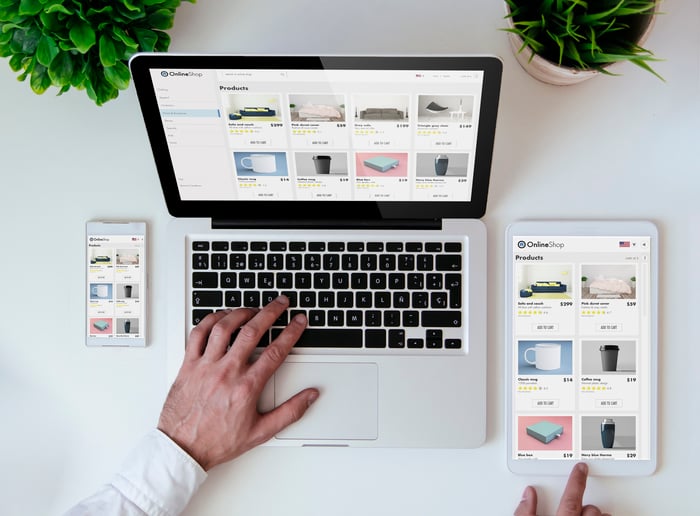There's no denying that Amazon is the undisputed king of e-commerce. The company -- which started life as an online book seller -- controlled 44% of the e-commerce market in the U.S. in 2019, up from 40% in 2018, according to estimates compiled by Bank of America. In the most recent quarter, that translated to net revenue for Amazon of $89 billion, up 40% year over year. However, while it's still the leader, it's no longer the only game in town.
The pandemic has caused a groundswell in the adoption of digital commerce with consumers shopping for everything from home goods to groceries and furniture, resulting in an acceleration of online purchases. According to figures just released by the Department of Commerce, e-commerce sales in the second quarter surged 44% year over year and 37% sequentially, accounting for 15% of total retail.
A rising tide lifts all boats, or so the saying goes. Let's look at three other companies that are growing their e-commerce sales much faster than Amazon.

Image source: Getty Images.
Wayfair: You've got just what I(nvestors) need
Before the pandemic reared its ugly head, it was still unclear if consumers would buy furniture online in sufficient quantities to make it a worthwhile endeavor over the long term. During the past few months, however, that question has been answered -- and it's a resounding "yes."
Wayfair (W 2.08%) was already one of the world's leading online destinations for home goods and furniture and was well-positioned to benefit from consumers doing more online buying. For the second quarter, the company reported net revenue of $4.30 billion, up 84% year over year. The impressive results were led by U.S. sales that jumped 83%, while international sales climbed 97% in local currencies.
The higher sales helped Wayfair generate a profit for the first time in years with net income of $274 million, up from a loss of $182 million in the prior-year quarter. This resulted in diluted earnings per share of $2.54.
Other metrics illustrate the reasons for Wayfair's stunning success. The company added five million new customers during the quarter, more than all of the past four quarters combined, bringing the total active customer base to 26.0 million. Additionally, new customer orders outpaced returning customers for the first time since its initial public offering (IPO) in 2014.
That's not all. Even though the stock has gained 222% so far in 2020 and is up more than 1,100% since it bottomed in mid-March, Wayfair still has a relatively inexpensive price tag, selling for just two times expected 2020 sales when a ratio between one and two is considered good.

Image source: Etsy.
Etsy: Retro and handmade goods are all the rage
Retro and vintage goods have always been something of a niche market, but with its focus on these categories, as well as handmade, one-of-a-kind items and craft supplies, Etsy (ETSY 0.34%) found a way to both expand and dominate the online market it pioneered. By providing the platform that connects buyers and sellers for these items, the company has created a digital goldmine.
Etsy's second-quarter results, even at the height of the pandemic, illustrate just how big an opportunity the company is chasing. Gross merchandise sales (GMS) soared 146% year over year to nearly $2.69 billion. This, in turn, pushed revenue to $429 million, up 137%. Both marketplace revenue and services revenue contributed to the blowout quarter, jumping 146% and 111%, respectively.
The company had an influx of 19.2 million new and "reactivated" buyers, or those who haven't purchased anything on the platform over the past year. This helped propel total active buyers to 60.3 million, up 41% year over year, while its active seller base of 3.1 million climbed 35%. Even more impressive was the number of repeat buyers, which grew 51% to 26 million.
It's important to note that the company enjoyed a pandemic-specific tailwind with the sales of face masks. Etsy said buyers on the platform who had only purchased masks amounted to about 7% of buyers, or about four million.
Etsy stock isn't cheap, selling at more than 10 times forward sales estimates, more than twice Amazon's multiple. Keep in mind, however, that recent revenue growth for the smaller marketplace tripled its larger peer, which helps put the premium price tag in context.

Image source: Sea Limited.
Sea Limited: The Amazon of Southeast Asia -- and more
Investors in the U.S. may not be as familiar with Sea Limited (SE 0.05%), but like the previous entries, the company is becoming a force in its own right in e-commerce. Sea Limited began life as an online gaming portal but has since parlayed its foothold in video games into an online domain that spans mobile gaming, e-commerce, digital payments, and more. Its e-commerce platform -- Shopee -- serves Indonesia, Taiwan, Vietnam, Thailand, the Philippines, Malaysia, and Singapore, and it is now the leading online sales platform (by gross merchandise volume) in the region.
In a tale that may sound familiar, e-commerce in Southeast Asia broke out in response to the pandemic and lockdown orders, and several parts of Sea's business soared. For the second quarter, revenue of nearly $1.29 billion climbed 93% year over year, as did its net losses, which jumped 41% to $394 million. Adjusted e-commerce revenue was up 188% as gross orders on its digital platform increased 150%, and gross merchandise volume (GMV) growth accelerated to 110%, up from 74% in the first quarter.
Shoppee now ranks as the No. 1 downloaded shopping app in the region and among the top three in the world, which should leave investors confident that Sea's pandemic-fueled momentum can persist.
The company is spending furiously to expand its digital empire, as evidenced by its expanding losses. It's also by no means cheap, currently selling for about 15 times expected 2020 sales. However, Sea Limited is serving a region with massive potential as e-commerce penetration lags that of more mature markets like the U.S.





